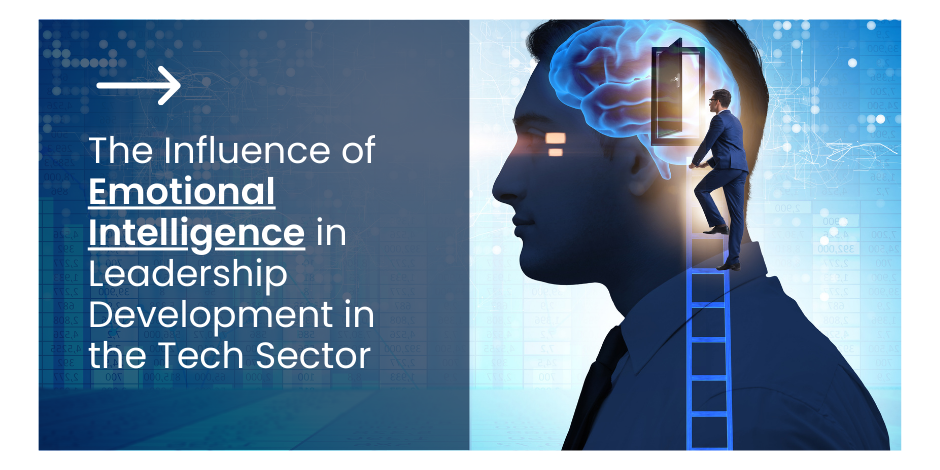The Influence of Emotional Intelligence in Leadership Development in the Tech Sector

Stay Informed With Our Weekly Newsletter
Receive crucial updates on the ever-evolving landscape of technology and innovation.
Emotional intelligence in leadership development is often overlooked in the tech industry.
It’s a key ingredient in creating effective leaders who can navigate the complexities of the tech world while fostering a positive work environment.
As Barry Shurkey, CIO at global IT consulting firm NTT DATA Services, wisely notes, [su_quote] By developing their skills in self-awareness, self-regulation, social awareness, and relationship management, leaders can guide their teams, inspire them, and bring them together in a way that encourages efficient communication and strong collaboration.[/su_quote]
This article explores the role of emotional intelligence in leadership development within the tech sector and its practical application in the workplace.
The concept of emotional intelligence

Emotional intelligence in leadership development refers to the ability to identify, understand, and manage one’s own emotions and those of others.
It’s a crucial aspect of interpersonal communication and relationship management, both of which are vital in leadership roles.
Emotional intelligence comprises four main components: self-awareness, self-management, social awareness, and relationship management.
These skills enable leaders to handle team dynamics effectively, manage stress, and make sound decisions.
Emotional intelligence in the tech sector
The tech sector, known for its fast-paced and high-stress environment, can greatly benefit from leaders with high emotional intelligence (or high EQ).
Tech leaders often face unique challenges, including managing remote teams, dealing with rapid technological changes, and navigating the complexities of innovation.
Higher emotional intelligence can equip them with the skills to handle these challenges effectively.
Moreover, incorporating emotional intelligence in leadership development fosters a positive work environment.
It promotes empathy, understanding, and effective communication, which are essential for team cohesion and productivity.
The role of emotional intelligence in leadership development

Leadership development in the tech sector requires more than just technical skills.
Emotional intelligence plays a significant role in shaping effective leaders.
It influences various aspects of leadership development, including decision-making, conflict resolution, and team management.
Emotional intelligence allows leaders to make smarter, informed decisions by considering the emotional impact on their team.
It also aids in conflict resolution by fostering empathy and understanding among team members.
Furthermore, emotional intelligence in leadership development promotes effective team management by enabling leaders to understand and respond to their team’s emotional needs.
Emotional intelligence and decision-making
Decision-making is a critical aspect of leadership. Leaders with high emotional intelligence can make balanced decisions by considering both logical and emotional aspects.
This approach leads to decisions that are not only effective but also considerate of the team’s emotional well-being.
Emotional intelligence in leadership development also promotes ethical decision-making.
A workplace that fosters high emotional intelligence is more likely to consider ethical implications when making decisions, leading to more ethical and responsible leadership.
Emotional intelligence and conflict resolution
Conflict is inevitable in any team setting.
However, leadership that prioritises emotional intelligence is much more likely to manage and resolve conflicts.
They’re able to do this by respecting the emotions and perspectives of all parties involved, which allows for fair and effective conflict resolution.
Furthermore, emotional intelligence in leadership development fosters a positive work environment by reducing conflict-related stress.
When those in leadership positions acknowledge and understand emotional intelligence, they’re capable of diffusing tense situations and promoting a more harmonious work environment.
Emotional intelligence and team management
Effective team management is a crucial aspect of leadership and allows upper management to understand their team’s emotional needs and respond accordingly.
This can lead to increased team satisfaction and productivity.
Moreover, emotional intelligence in leadership development also promotes diversity and inclusion.
Leaders and businesses who understand and appreciate the diverse emotions and perspectives within their team foster a more inclusive work environment.
Developing emotional intelligence in tech leadership

Developing emotional intelligence in tech leadership is a continuous process.
It involves self-reflection, feedback, and ongoing learning.
Emotional intelligence training can also be beneficial in enhancing these skills.
Self-reflection allows leaders to understand their emotional strengths and weaknesses.
Feedback provides insights into how others perceive their emotional intelligence.
Ongoing learning keeps leaders updated on the latest emotional intelligence research and strategies.
Emotional intelligence training
Emotional intelligence training can significantly enhance leadership development in the tech sector.
It provides leaders with the tools and strategies to improve their emotional intelligence.
This includes techniques for managing emotions, improving social awareness, and enhancing relationship management skills.
Moreover, emotional intelligence training can provide practical exercises for applying these skills in real-world situations.
This allows leaders to practise and refine their emotional intelligence skills, leading to more effective leadership.
Conclusion
Emotional intelligence in leadership development plays a crucial role in the tech sector.
It influences decision-making, conflict resolution, and team management, fostering effective and empathetic leadership.
Developing emotional intelligence in tech leadership is a continuous process, but with self-reflection, feedback, and training, leaders can enhance their emotional intelligence and become more effective in their roles.
If your organisation is looking to upskill in its offerings and skills, consider the Institute of Data’s Corporate Training Program.




